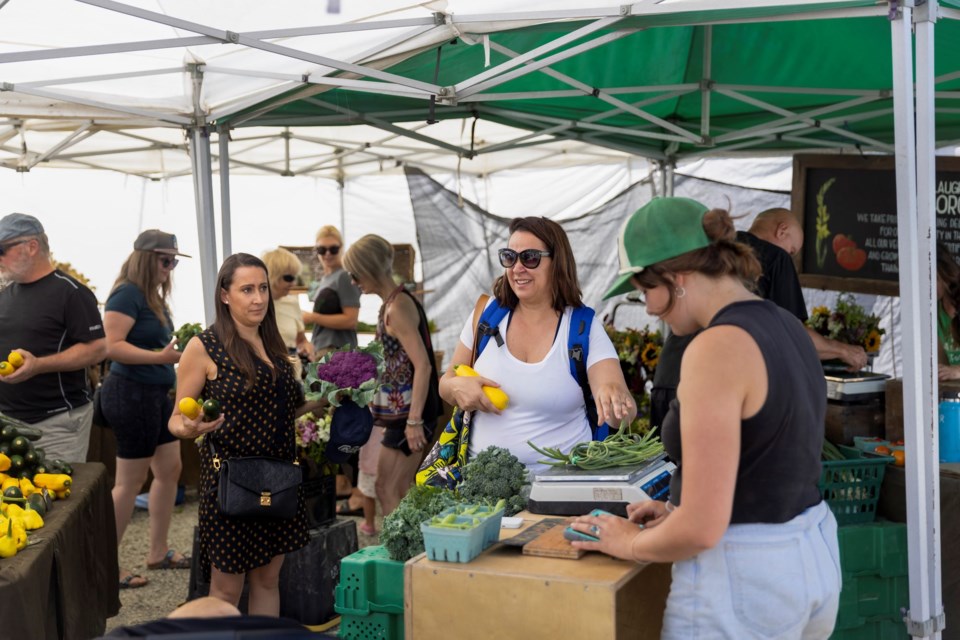The B.C. Association of Farmers’ Markets (BCAFM) has unveiled a new five-step challenge, encouraging both newcomers and veteran shoppers to stay plugged in with their local markets this summer.
Folks all around British Columbia, including Whistler, can download the Tasting Passport App and sign on to the challenge: shopping local, planning a visit, going green (i.e. walk, bike or take transit to a market), exploring (adding various markets to one's summer travel itinerary using the B.C. Farmers’ Market Trail tool) and staying connected to their favourite locations online.
BCAFM membership and programs manager Melissa Maltais says the five-step initiative was launched in the wake of economic and political uncertainty between Canada and the United States.
"Whenever there's a big event like COVID or atmospheric rivers, all of a sudden [everybody on] social media is just like: 'buy local, buy local.' The tariffs popped up in March, we saw this happening yet again and we just wanted a way to capture that momentum," she explains. "We're trying to get people to habit-stack, so we want them to set a goal of once a month if they've never been to the farmers' market. That gets you into that mindset of [investing the time to go], even if it's just to look first.
"You don't have to check labels at farmers' markets. You can just be there at a BCAFM member market and know that everything is B.C., everything is Canadian. We also wanted to up the ante a little bit and see if we [convince] folks to get there sustainably."
The Whistler Farmers' Market (WFM) has brought in a range of new vendors this year, with a total of roughly 130 across a season and 70 present on any given day. It remains food-focused with all the essentials like meat, bread, produce, eggs, fish, hot dishes and canned options.
"Over the years, we’ve expanded programming to include live music, deepened our community partnerships, and prioritized sustainability through initiatives like our zero-waste program with AWARE Whistler," says WFM manager Bree Eagles. "At the same time, we’re not immune to the changing business landscape. As farms expand their business models to focus on CSA and farm delivery services, it’s more important than ever for communities to show up and support farmers at local markets—that direct connection and financial support makes a real difference and helps ensure they can continue showing up."
Some might view farmers' markets as quaint little community operations, but don't discount the financial splashes they can make.
A 2023 study revealed that British Columbia's markets contributed more than $232 million to the local economy. That year, the Sea to Sky alone generated $9.8 million of economic impact, with $6.5 million originating from direct WFM sales. The average person reported spending about $44 per visit, and 92 per cent reported shelling out an additional $56 at nearby businesses.
"It is pretty significant," Maltais remarks. "The Whistler Farmers' Market is a great example because there are patios, there are other businesses [in the village]. We have quite a few members that are in a downtown core, and they find ways to incorporate their farmers' markets with [Business Improvement Areas]. It's great to be able to see how we're doing in terms of being a major driver of business incubation."
Food security
Another misconception people may have about farmers' markets is that they're relatively expensive. Eagles and her colleagues decided to put this narrative to the test.
"We would pick seasonal produce items and compare their cost at the farmers' market versus a supermarket. Quite often the cost of an item [at the farmers' market] was less than, or at least equal to, the supermarket," Eagles says. "You're buying organic produce compared to non-organic produce at super comparable price points. The other way we're really contributing to [local food accessibility] is via the province-wide Farmers’ Market Nutrition Coupon Program.
"Our partner is the Whistler Community Services Society, and they receive coupons that get distributed to certain community members in need. [Last year] we had about $24,000 worth of produce that got redeemed via that program. The food bank often comes around at the end of the market as well, and our vendors are really generous in that department. We're having this really direct impact on food security in the region."
Maltais hopes markets across the province will see an uptick in visitation. She states that British Columbian farmers are currently unable to grow enough produce to sustain citizens without external aid, but hopes a lively farmers' market sector (and in turn, more money funnelled towards agriculture) can alleviate the problem.
If you haven't checked out the WFM yet, don't worry: there'll be plenty more good stuff coming.
"I always get super excited once we hit July, August, and we get this abundance of produce coming in," adds Eagles. "I think the best is yet to come in our season. It's a really great way to make your weekly shopping an experience, and that money goes directly into locals' hands. The market is open to B.C.-based producers who meet the 'make it, bake it, grow it' mandate: meaning all products must be made, baked, grown, raised, caught, or wild-harvested by the vendor themselves."
The WFM opens each Sunday until Thanksgiving in October, with long weekends featuring a smaller Saturday market as well. Learn more at whistlerfarmersmarket.org.




